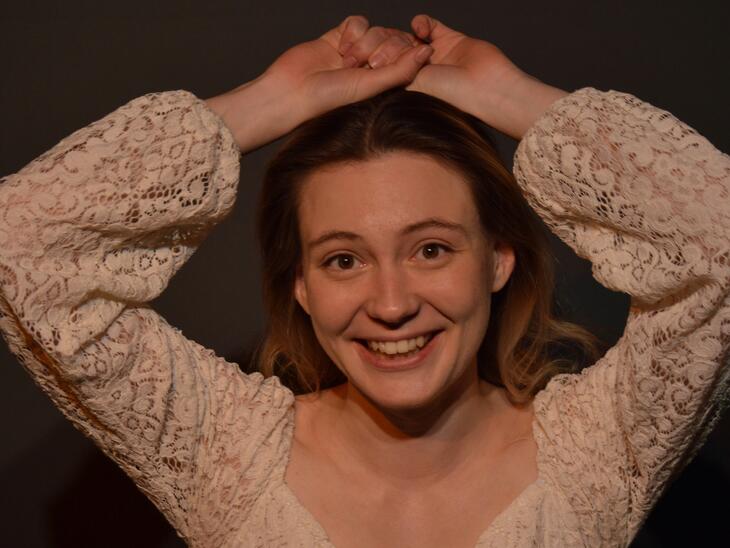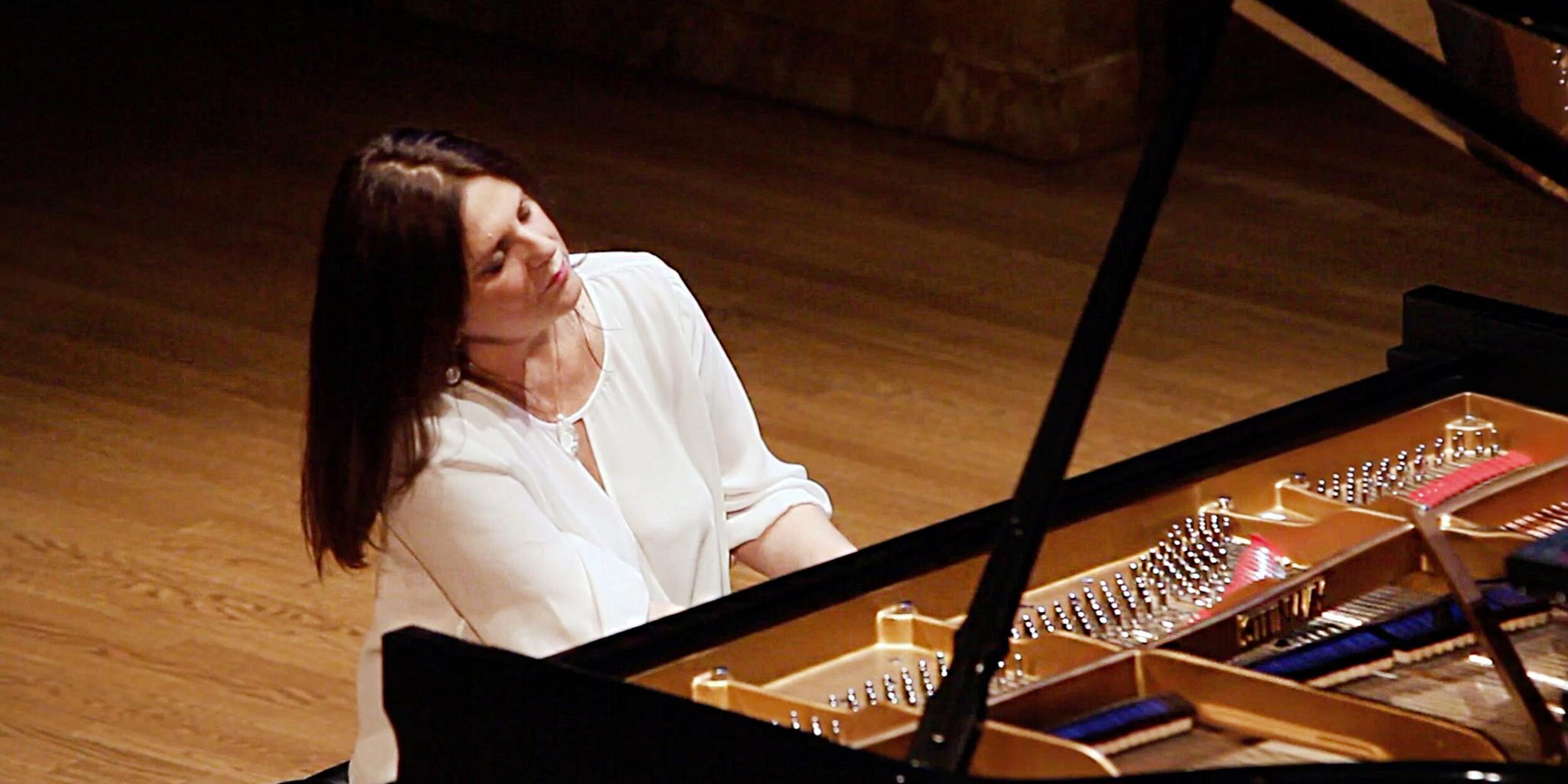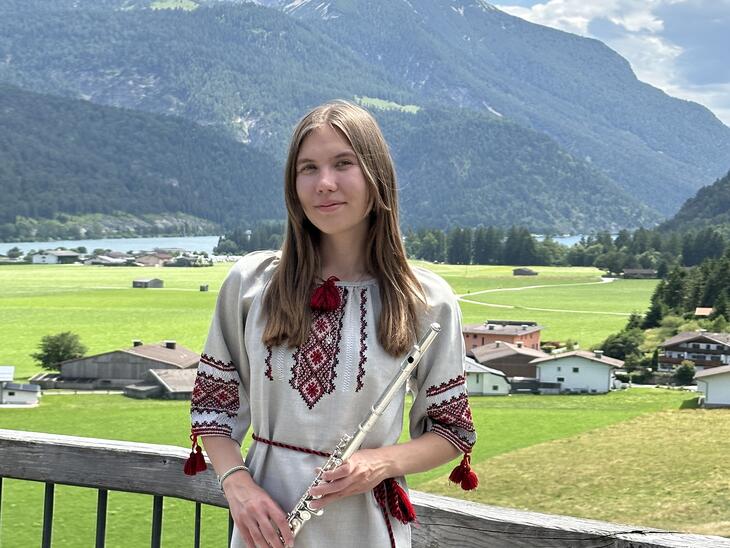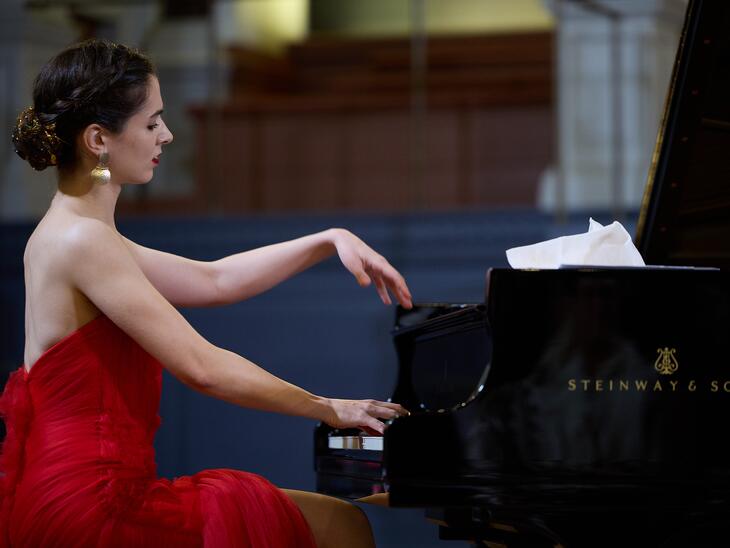The recordings are available internationally in the ‘Spirio Library’, which is constantly being expanded. She has won numerous competitions, performed at many international festivals and worked with a number of renowned orchestras. As an academic and educator, she has given masterclasses, information sessions and concerts at Harvard University, the Massachusetts Institute of Technology and Purchase College. She has also taught at Georgetown, Princeton University, New York University, Bosphorus University and many other universities. She is a two-time winner of the Judelson Award and the Laura Conover Pedagogy Award in New York. Meral is always interested in and committed to the promotion of contemporary music. She has premiered works by Justin Dello Joio, Ilhan Mimaroglu, Dick Hyman, Pablo Ziegler and others. In addition to her artistic activities, she has been involved in many charitable organisations for which she has successfully raised funds.
She has been a Steinway Artist for 16 years and Cultural Advisor of World Council of Peoples for the United Nations for 10 years. Meral is an alumna of The Juilliard School and Berklee College of Music as well as the International Summer Academy of the Mozarteum University Salzburg.
How did you come to the Mozarteum International Summer Academy in 1969?
My professor at the Istanbul Conservatory was Friedrich von Statzer. He was an Austrian who had studied piano and composition at the Mozarteum and was well acquainted with Friedrich Wührer and Emil von Sauer. Von Statzer had been living in Turkey since 1932. That was my great good fortune, as it was for many other virtuosos he produced, including my sister Professor and concert pianist Tiraje Güneyman Ruckman. Statzer was an extraordinary, very serious teacher, but at the same time a kind, gentle man. His relationship with the Mozarteum, his own experience and his friendship with Wührer played a major role in sending my sister and me to the summer courses in Salzburg. He wanted us to broaden our horizons and develop our art. And so we did.
What was it like back then? What experiences did you have?
It was great and magical. Firstly, to be in an environment that was so historically and musically significant, and secondly, to come to a European institution, in the presence of legendary artists, to play for them and learn from them. It was a fantastic privilege. The best thing was coming into a whole new musical group with people from many parts of the world, the music we shared, the enthusiasm for the new, colourful repertoire I heard. It was the feeling of taking the first steps towards an artistic endeavour that would last a lifetime. You know, I look at the pictures of the old Mozarteum building and it brings tears to my eyes because of its architectural beauty and all the memories of my pianistic youth.
Is there a special memory?
Yes, when my sister and I were chosen to play at the final concert at the Mozarteum as soloists and as a duo. Professor Wührer told us that our Ravel performance was worthy of acceptance. We were very pleased. I think the concert took place in the beautiful Wiener Saal. It was a pity that we didn't have mobile phones back then to record the situation with camera and sound.
What are your favourite and most important experiences in your job?
There are so many beautiful and important experiences, but the first major competition I won, which led to three concerts conducted by Michael Tilson Thomas, with Buffalo Philharmonic and Pittsburgh Symphony, was incredible. Six finalists played a recital programme at the Naumburg International Piano Competition in the main hall of Carnegie Hall. When I looked up from the amazing Steinway grand piano, it seemed like there was no roof and you could see into the sky, and the piano sounded like angels singing. I also took part in the Mexico Cervantes Festival, my concerts were in a monastery overlooking gardens full of butterflies when I played. I also became friends with the jazz pianist Bill Evans in the seventies. We had many conversations during his breaks at the Village Vanguard. He invited me to his house, I got to meet his family and we spent an afternoon playing music as he listened to my compositions and played for me. My first recording session for Warner Records, at RCA Studios, was also breathtaking. As I walked through the corridors with the gold discs of famous musicians hanging on the walls, I asked myself: what am I doing here?
How has your career as an artist and concert pianist changed over time?
As a teenager, I already knew that my life would be music and my passion would be the piano. From then on, everything happened very quickly: Juilliard, competitions, concerts, festivals and recording contracts. I mention competitions not because I love them, but because they were a necessary evil, as my professor at Juilliard always said. After I became a mother of two sons and life had a few surprises in store for me in the nineties, I had to open a school in New Jersey. To do so, I became certified in early childhood music education. Within a few years, I had more than a hundred students of all ages, from a wide variety of instruments to musical theatre. This experience was the fastest growing endeavour of my life. During these years I began to play jazz more seriously and I dedicated myself to jazz transcriptions and interpretations with boogie woogie. Gradually I expanded my playing to several styles. Then I met jazz master Dick Hyman, who took me by the hand and let me play to sold-out audiences at his annual New York concerts - with him, but also solo. I guess the work I'm most proud of is the variety of music I've played and recorded, from Chopin to Ravel and Beethoven and all the ones we've studied, to Frank Bridge, Webern, and contemporary American composers as well. Jazz or classical, Philip Glass, John Cage, Morton Feldman, Copland and Barber and Broadway, to Christmas arrangements and transcriptions by me of Duke Ellington, David Bowie, Billie Holiday, Joni Mitchell and many more. All of these arrangements have been published and are available from Hal Leonard. I try to play all good music. For example, my last concert in New York was on the theme of water and included works by Ravel, Rachmaninoff, Janáček and John Adams. According to Duke Ellington's famous words, there are only two kinds of music: good and bad.
With your instrument, you play classical music as well as jazz and pop. How do you manage to combine these genres?
Firstly, you have to have a genuine love and interest in pop and especially jazz. I remember as a child I used to pick up the entire soundtrack of ‘West Side Story’ by ear and play it. I loved it. So a good ear and a genuine desire to think outside the box are essential. I was lucky because my teachers never discouraged me from always discovering new things. With this interest, I began to discover harmonic progressions and melodic patterns, even in different rhythmic disciplines. As I developed as a musician, I was able to start practising improvisation, which is the most difficult because it uses a different part of the brain. Then there is the fear of not having written music that would give security and what you create freely makes you vulnerable. I remember rehearsing with Dick Hyman. He didn't let me know what we were playing until the last day. Unimaginable! He said: ‘I'll do this here and you can do that there.’ And so on... and everything fell into place. I trusted him and he made me trust myself. If you're an open-minded musician, it's wonderful to play, to understand all these sounds and bring them together. After the pandemic, I gave a concert in New York. I played ‘Frühlingsopfer’ by Stravinsky with my friend Christopher O'Riley to songs by David Bowie, which I arranged. For this concert I also arranged the first movement of Symphony No. 1 by Philip Glass (based on the album ‘Low’ by David Bowie) for two pianos, which I played with Jed Distler. In the finale, the outstanding arrangements by Jed Distler on Thelonius Monk and Radiohead arranged by Christopher O'Riley. So anything is possible. Jed Distler and Christopher O'Riley are musicians that everyone should know. Both are masterful composers and pianists, arrangers and radio presenters, Jed is also a highly respected critic. When you find like-minded friends to collaborate with, it's inspiring and so much fun. I love that atmosphere.
What advice would you give your younger self?
Oh, just take every opportunity, they may never come again. Don't waste time, work more, read more. It's about art, art will always be there even in the most difficult times. Always nurture it.
What are the biggest differences for a pianist between the USA and Austria or the German-speaking world?
Well, that reminds me of the different values represented by American and European culture. I know from my own experience and from talking to my American pianist friends who have lived and worked in Germany for many years that Germany and Austria are superior in the field of music. My friend, pianist Marioara Trifan, noted that the attention, care and funding of music education in Austria and Germany, especially in recent years, has produced amazing results. I am pleased that Austria is at the forefront of classical music appreciation and that Germany is almost at the same level. The United States makes up for this through the generosity and support of foundations, private funds and initiatives. University education here is excellent, but also very expensive, whereas in Germany and Austria it is practically free. Much more quantity in a much smaller space. That says a lot.
You work as a teacher yourself. What has changed in education over the years?
I was very lucky to have teachers from the ‘golden era’, a generation that is gone forever. I mean, all my teachers' roots go back to Beethoven, and in my time at Juilliard I had a Russian teacher. Music education will always be of high quality as long as the best teachers pass the torch to new talents of future generations, to students who will then do the same again. But I feel that some of the authenticity is lost these days in the technological standards and marathon-like competitions. I feel that young pianists sometimes strive for superhuman techniques and they may value that more than deep artistry. True artistry and the longevity of a career depend on deeply felt, lifelong study.
What is important for music and art today? What needs to change?
No matter where your interest lies or what career you choose, a childhood arts education environment plays a critical role in a young person's development. However, in the United States, budgets for arts education in schools are being cut. According to my friend who lived in Germany for many years, this trend is also taking hold in German schools. So much depends on the family that prioritises art and music. And it also depends on cultures, economies and communities how important and valuable music and art are for life. And yet the arts don't lend themselves well to hard data, something that educators and policy makers need to justify teaching these disciplines in their budgets. A professor at New York University has noted that art is a visceral thing and really hard to qualify what it means. As young people are now inundated with social media and artificial intelligence, it has become even more important to learn how to think critically and creatively. How can we find a happy balance? I don't know.
Your wishes for the future?
My greatest wish is to visit the Mozarteum again. I would love to give concerts in both genres, jazz and classical.
Is there anything else you would like to pass on to us?
Thank you very much for your time and I wish you all the best at the Mozarteum.




